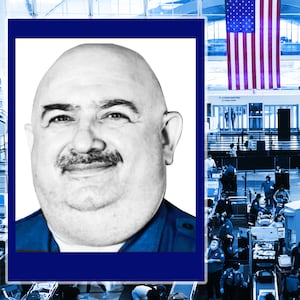What was supposed to be a relaxing beach vacation to southern Mexico turned into a nightmare when an older couple came down with COVID-19 last month. Now, their daughter is begging other travelers to stay put.
“Even if you’re taking precautions… you don’t know what’s going to happen,” the daughter, Jocelyn Arellano, said. “And if you’re far from your family, from people you know, it’s a horrible experience.”
Jose and Gloria Arellano purchased their tickets to Oaxaca in the beginning of the pandemic. By November, they had yet to use them—and they lost money every time they pushed off their travel. So on Nov. 11, just as Mexico’s cases spiked to their highest levels yet, they headed south from their home in Tijuana for what they hoped would be a relaxing two-week respite.
About 10 days into the trip, Jose, 56, who suffers from asthma, started having trouble breathing. At first they thought it was just the difference in air quality in Oaxaca. But then, three days later, Gloria, 54, developed a fever, and the couple decided it was time to get tested for the coronavirus. They had not even received their test results before Jose’s breathing became so labored that they rushed him to the emergency room. The hospital sent him away with an oxygen tank and some medication.
By Nov. 23, Jose’s condition had deteriorated so much that the family knew he needed to be admitted to the hospital. From her home in San Diego, where Jose used to work for the county, Jocelyn started looking for hospitals that would allow him in. All the public hospitals in Oaxaca were completely full, and the private hospitals were too expensive. Eventually, a doctor she contacted suggested they have an air ambulance fly him back to San Diego where, as a U.S. Navy veteran, he could be treated at the local Veterans Affairs hospital.
The ambulance arrived at the Arellanos’ Airbnb two days later and the crew immediately intubated Jose. By 2 p.m. that day, he was at the veterans hospital, where Jocelyn was waiting for him. She watched as orderlies rolled her father on a stretcher from the air ambulance to the ICU, completely sedated. She has not seen or spoken to him since.
Meanwhile, back in Oaxaca, her mother’s condition was also deteriorating. Gloria had tried to stay strong for her husband, Jocelyn said, but the minute he left, “her body just started to shut down.” Jocelyn’s brother, Christian, went down from Tijuana to take care of her in her weakened state. But by Friday she, too, was admitted to the ICU.

Gloria Arellano
Courtesy of Jocelyn ArellanoMexico surpassed 1 million total cases of the coronavirus on Nov. 14, three days after Jose and Gloria left for their vacation. The country has since passed more than 100,000 deaths, and has tallied nearly 200,000 new cases in the last month, according to Johns Hopkins University. This week, the Centers for Disease Control urged Americans not to travel to Mexico, assigning the country its highest warning level. The State Department has also urged U.S. citizens to reconsider any travel to the country.
Still, as the winter months progress, the country has become a hotspot for Americans looking to flee the cold. The travel booking site Kayak reported three of its most-searched holiday destinations are in Mexico, and American Airlines last month declared it the “clear leader” in international travel from the U.S. Volaris, a low-cost airline serving the U.S.. Mexico and Central America, said demand was up 13.1 percent in October compared to the same time last year.
Jocelyn had a clear message for those looking to travel this holiday season.
“It’s not worth the risk,” she said. “I’d rather my parents would have lost the money for the plane tickets.”
Jocelyn’s mother was released from the hospital Monday. She still requires supplemental oxygen and frequent check-ins with a doctor, but is recovering in the Airbnb with Christian, who now has also tested positive for the virus. Her husband, however, remains in the ICU on a ventilator. He is in stable condition, but Jocelyn said doctors have already asked her permission to put him on dialysis should his kidneys fail.
The cost of the treatment is staggering—Gloria’s hospital stay was roughly $4,000 a night, Jocelyn said—and the family has started a GoFundMe to make up some of the costs. So far, they have raised nearly $12,000.
Jocelyn said it was heartwarming to see the amount of support her family had received. Talking about it is still painful, she said, but worth it if she could convince others “not to travel and not to risk it.”
“With all we’ve gone through, I really wouldn’t want anyone else to experience this,” she said.







